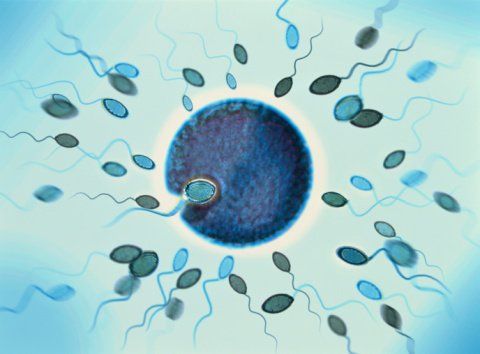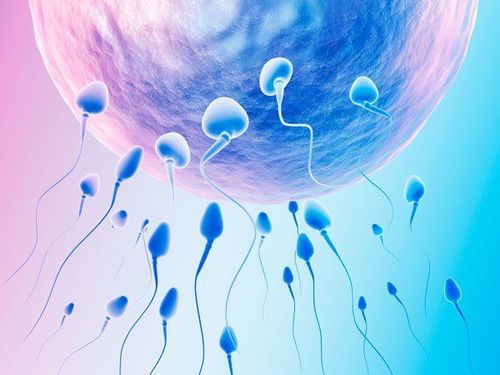This is an automatically translated article.
The article was professionally consulted by Specialist Doctor I Nguyen Thi Man - Department of Obstetrics and Gynecology - Vinmec Danang International General Hospital.Infertility is a condition in which a couple does not become pregnant after 12 months of living together, having normal intercourse and not using any contraception. According to research, the current infertility rate among young Vietnamese couples is 7.7%. In particular, primary infertility is more common than secondary infertility, and the rate is usually higher in men than in women.
1. What is primary infertility?
Infertility is a condition in which a couple does not get pregnant after 12 months of living together, having normal intercourse without using contraception. However, for the case of the wife over 35 years old, this time of not getting pregnant is only about 6 months to be evaluated for infertility. Primary infertility is infertility in couples where the wife has never been pregnant.
About 40% of infertility cases have male causes, 40% have female causes, 10% are due to both sides, and the remaining 10% have unexplained infertility. In order to treat infertility, both husband and wife need to go to the doctor to find out the cause, from which there will be a reasonable treatment plan.
2. What is the cause of primary male infertility?
Causes of male infertility can be due to low sperm count, malformed sperm, low sperm motility or no sperm at all. Causes of poor sperm quality or low sperm count include:
Testicular abnormalities such as orchitis, vasculitis, varicocele or male sex hormone abnormalities. ..; Due to the use of drugs affecting sperm quality such as drugs to treat stomach pain, high blood pressure ... make sperm motility poor; As a result of sexually transmitted diseases, it leads to inflammation of the vas deferens, causing narrowing of the passageway that transports sperm from the testicles to the testicles; Due to diseases: Urinary tract infections, epididymitis due to complications of mumps; Tuberculosis of the testicles, varicose veins that cause sperm to be deformed or have an abnormal structure in the head - body - tail; diabetes, high blood pressure or advanced age, impotence, low sex drive; Due to the influence of radioactive rays; Due to alcoholism, tobacco... can cause sperm mutations; Due to prolonged stress or the husband and wife are having pent-up conflicts, unable to speak out... can also lead to male infertility; Diseases such as liver disease, kidney disease, sickle cell deficiency, genital disease... if not treated promptly, can lead to male infertility.

3. What is the manifestation of primary male infertility?
Some signs of primary infertility in men are:
Painful ejaculation, semen with blood; The scrotum is enlarged, round, and tender on one or both sides; The testicle is twisted or the testicle is not in the correct position in the scrotum; Testicles have swelling, pain, redness due to severe epididymitis or testicular torsion, making it impossible for blood to move to nourish the testicles; Men suffering from erectile dysfunction and premature ejaculation problems; Pain at the tip of the penis, accompanied by a discharge of green or yellow pus. In addition, men can recognize the signs of infertility through a number of systemic symptoms such as: hair loss, belly fat, dry and wrinkled skin, sweating, severe stress, always having sex. feeling anxious, restless...
4. What are the causes of primary female infertility?
Causes of female infertility are often due to tubal and peritoneal disease (accounting for about 70%), ovulatory disorders (about 20%) and 10% of unknown causes. There are many causes of primary infertility in women, most of which are caused by gynecological diseases, the following are the main causes:
Inflammatory diseases in the pelvic area: Pelvic inflammatory disease caused by bacteria such as Chlamydia, gonorrhea ... cause; Due to polycystic ovary disease: The phenomenon of ovaries having many small cysts, irregular menstruation (only one period every few months) or ovulatory disorder, this is one of the causes of infertility; Due to blocked fallopian tubes: Inflamed fallopian tubes leave scars, narrowing or blocking the fallopian tubes, preventing the passage of eggs and sperm, causing infertility. One of the main causes of blocked fallopian tubes in women is the lack of hygiene during the menstrual cycle. When it comes to periods, the vagina is in an open state, creating favorable conditions for harmful bacteria to enter and cause infection if women do not clean properly and appropriately. Vaginal infections or cervicitis, if not treated, will flow upstream to the fallopian tubes, causing blockage of the fallopian tubes; Due to poor egg quality: The egg is not able to form a zygote with the sperm; Due to diseases in the uterus: Uterine fibroids, uterine polyps...; Due to some other diseases such as: gout, obesity, diabetes, kidney disease, liver disease, thyroid disease...; Due to the use of drugs, it causes side effects. In addition to medical causes, health status and nutrition also affect fertility. If men and women regularly eat and drink foods containing many toxic substances, smoke, drink alcohol, use drugs, be exposed to chemicals, and have a polluted environment, their fertility will be affected. both male and female. Age also affects fertility: women after the age of 35 have a harder time getting pregnant than younger women.

5. Signs of primary female infertility
It is difficult to recognize the signs of female infertility in cases where the cause is unknown. The following are the most common signs:
Menstrual disorders: Amenorrhea, menorrhagia lasting more than 10 days; dysmenorrhea, menstruation is too little, menstruation lasts only for the first 2-3 days and then stops completely, menstruation is black and clumpy...; The body is always tired: Women are always tired, in a state of obesity or too thin and sick, pale or yellow skin, headache, dizziness ... This is not the main sign of infertility but are signs of other diseases affecting female fertility such as liver, kidney, cardiovascular, endocrine diseases...; Regular sex without pregnancy: In case the couple does not have any of the above symptoms, have regular sex 2-3 times a week without using any contraception for a period of time. period but still not pregnant - this is one of the most obvious signs of infertility.
6. How to examine and treat primary infertility?
The doctor will order to perform tests such as: blood test, urinalysis, gynecological / gynecological examination, utero-tubal imaging in women or semen analysis in men gender, male/female genital examination to find out the cause of male/female infertility.
After determining the cause of infertility, the doctor will have an appropriate treatment for each specific case. The treatment of primary infertility may be medical or surgical intervention may be required. In case of infection, the patient will be treated with antibiotics to destroy inflammation, kill bacteria, and improve health. In the case of men who have no sperm, drugs that stimulate hormone secretion will be used to promote the production of more sperm with a success rate of up to 90%. Similarly, hormonal medications may also be indicated for abnormalities of the ovaries or reproductive system in women.
In addition, the doctor can prescribe some modern assisted reproductive methods such as: intrauterine insemination or in vitro fertilization (IVF). In particular, the method of sperm injection into the uterus is often prioritized to proceed first with many advantages in terms of time, cost and high efficiency.
Treatment of primary infertility takes determination and perseverance. Both husband and wife need to be psychologically comfortable, ready for long-term treatment, should not be discouraged but give up halfway, must comply with the prescription of a specialist, constantly hope and believe. in a good future.
7. Where is the best place for infertility treatment?
Understanding the desire to have children of infertile and infertile couples and the desire to contribute to providing the opportunity to be fathers and mothers for those unfortunate couples, Vinmec International General Hospital Time City has established and put into operation the IVF Fertility Center since November 2014. As of November 2018, the Center has assisted reproduction for more than 1000 infertile couples with a clinical pregnancy rate of 45%-50% - a very positive rate.
A lot of infertile and infertile couples spend effort and money to go to many places from home to abroad for examination and treatment with no results, but when they come to Vinmec IVF Fertility Center, They finally became fathers and mothers. Vinmec IVF Center has made continuous efforts, bringing the latest advances in modern medicine to effective reproductive support, so that it is worthy of being the place where couples hope to get pregnant and give birth. couple.
Here gathers a team of doctors who are leading experts in the field of reproductive support with professional qualifications and high skills. In addition, IVF Vinmec also uses the most advanced methods of assisted reproduction, including:
Intrauterine insemination (IUI); Classic in vitro fertilization (IVF); Intracytoplasmic sperm injection (ICSI); Support embryo escape membrane; Blastocyst transfer – day 5 embryo transfer; Cryopreservation of embryos, ovules and sperm; Donating eggs, sperm and embryos; Male infertility techniques: Sperm aspiration from the epididymis (PESA), Microsurgical epididymal sperm aspiration procedure (MESA),... Modern facilities and equipment system, ensure the best conditions for embryo culture such as the ISO 14644-1 international standard class I clean room system, the Labo is designed with one-way, positive pressure blowing clean air and a mini embryo culture cabinet system...
Specialist Doctor I Nguyen Thi Man was former Head of Obstetrics Department - Tam Tri Da Nang General Hospital, Head of IUI Unit (Intrauterine Insemination) - Hoan My Hospital - Da Nang. The doctor has more than 10 years of experience in diagnosing, consulting and treating in the field of Obstetrics and Gynecology such as:
Infertility examination and consultation, implementation of assisted reproductive techniques such as: Ovulation monitoring, intrauterine insemination (IUI) Examination, ultrasound, screening and treatment of gynecological diseases Laparoscopic surgery for ovarian cysts, ectopic pregnancy
Please dial HOTLINE for more information or register for an appointment HERE. Download MyVinmec app to make appointments faster and to manage your bookings easily.














